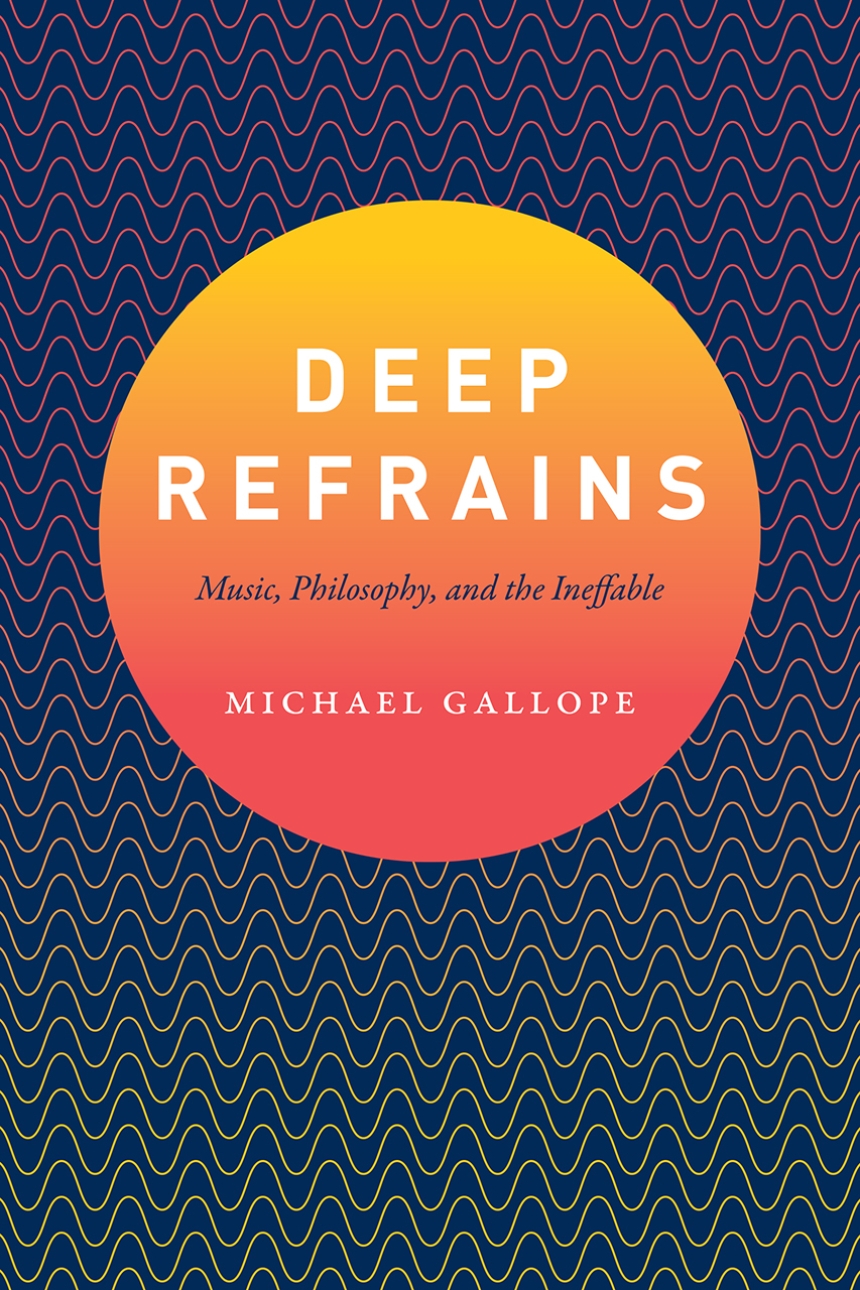Deep Refrains
Music, Philosophy, and the Ineffable
We often say that music is ineffable, that it does not refer to anything outside of itself. But if music, in all its sensuous flux, does not mean anything in particular, might it still have a special kind of philosophical significance?
In Deep Refrains, Michael Gallope draws together the writings of Arthur Schopenhauer, Friedrich Nietzsche, Ernst Bloch, Theodor Adorno, Vladimir Jankélévitch, Gilles Deleuze, and Félix Guattari in order to revisit the age-old question of music’s ineffability from a modern perspective. For these nineteenth- and twentieth-century European philosophers, music’s ineffability is a complex phenomenon that engenders an intellectually productive sense of perplexity. Through careful examination of their historical contexts and philosophical orientations, close attention to their use of language, and new interpretations of musical compositions that proved influential for their work, Deep Refrains forges the first panoptic view of their writings on music. Gallope concludes that music’s ineffability is neither a conservative phenomenon nor a pious call to silence. Instead, these philosophers ask us to think through the ways in which music’s stunning force might address, in an ethical fashion, intricate philosophical questions specific to the modern world.
In Deep Refrains, Michael Gallope draws together the writings of Arthur Schopenhauer, Friedrich Nietzsche, Ernst Bloch, Theodor Adorno, Vladimir Jankélévitch, Gilles Deleuze, and Félix Guattari in order to revisit the age-old question of music’s ineffability from a modern perspective. For these nineteenth- and twentieth-century European philosophers, music’s ineffability is a complex phenomenon that engenders an intellectually productive sense of perplexity. Through careful examination of their historical contexts and philosophical orientations, close attention to their use of language, and new interpretations of musical compositions that proved influential for their work, Deep Refrains forges the first panoptic view of their writings on music. Gallope concludes that music’s ineffability is neither a conservative phenomenon nor a pious call to silence. Instead, these philosophers ask us to think through the ways in which music’s stunning force might address, in an ethical fashion, intricate philosophical questions specific to the modern world.
336 pages | 10 halftones, 20 line drawings | 6 x 9 | © 2017
History: History of Ideas
Music: General Music
Philosophy: Aesthetics, General Philosophy
Reviews
Table of Contents
Musical Examples
Figures
Introduction
Prelude: A Paradox of the Ineffable
0.1 Schopenhauer’s Deep Copy
0.2 The Platonic Solutions
0.3 Four Dialectical Responses (after Nietzsche)
1 Bloch’s Tone
1.1 The Tone
1.2 The Natural Klang
1.3 The Expressive Tone
1.4 Bloch’s Magic Rattle
1.5 The Tone’s Ineffable Utopia
1.6 The Event-Forms
1.7 A Dialectical Account of Music History
1.8 Utopian Musical Speech
2 Adorno’s Musical Fracture
2.1 Adorno’s Tone
2.2 Adorno’s Conception of History
2.3 Tendenz des Materials
2.4 Music’s Language-Like Ineffability
2.5 The Immanent Critique
2.6 The Paradox of Mahler’s Vernacular
2.7 The Curve of Inconsistency
Interlude: Wittgenstein’s Silence
3 Jankélévitch’s Inconsistency
3.1 Bergson and the Inconsistency of Time
3.2 The Aporetic Source of Fidelity
3.3 Charme
3.4 Cosmic Silence
3.5 Unwoven Dialectics
4 Deleuze and Guattari’s Rhythm
4.1 Deleuze’s Rhythm
4.2 The Rhythm of Sense
4.3 A Structuralist Quadrivium
4.4 The Rhythm of Life
4.5 Sonorous Coextensions
Conclusion: A Paradox of the Vernacular
Acknowledgments
Notes
Select Bibliography
Index
Figures
Introduction
Prelude: A Paradox of the Ineffable
0.1 Schopenhauer’s Deep Copy
0.2 The Platonic Solutions
0.3 Four Dialectical Responses (after Nietzsche)
1 Bloch’s Tone
1.1 The Tone
1.2 The Natural Klang
1.3 The Expressive Tone
1.4 Bloch’s Magic Rattle
1.5 The Tone’s Ineffable Utopia
1.6 The Event-Forms
1.7 A Dialectical Account of Music History
1.8 Utopian Musical Speech
2 Adorno’s Musical Fracture
2.1 Adorno’s Tone
2.2 Adorno’s Conception of History
2.3 Tendenz des Materials
2.4 Music’s Language-Like Ineffability
2.5 The Immanent Critique
2.6 The Paradox of Mahler’s Vernacular
2.7 The Curve of Inconsistency
Interlude: Wittgenstein’s Silence
3 Jankélévitch’s Inconsistency
3.1 Bergson and the Inconsistency of Time
3.2 The Aporetic Source of Fidelity
3.3 Charme
3.4 Cosmic Silence
3.5 Unwoven Dialectics
4 Deleuze and Guattari’s Rhythm
4.1 Deleuze’s Rhythm
4.2 The Rhythm of Sense
4.3 A Structuralist Quadrivium
4.4 The Rhythm of Life
4.5 Sonorous Coextensions
Conclusion: A Paradox of the Vernacular
Acknowledgments
Notes
Select Bibliography
Index
